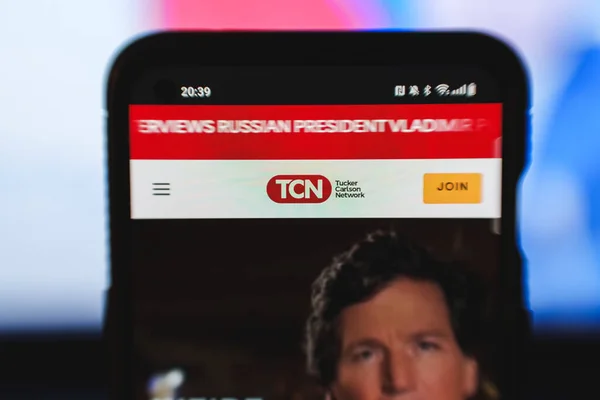In a moment of rare candor, Russian President Vladimir Putin engaged in a sharp-witted dialogue with American broadcaster Tucker Carlson, weaving through a tapestry of history, geopolitics, and personal anecdotes.
This dialogue, which marks Putin’s first extended interview with a Western journalist since the onset of the Ukraine conflict, reveals more than the undercurrents of international relations—it sheds light on the narratives driving global geopolitics and the role of personal histories in shaping them.
The Historical Interplay with Personal Aspirations
During the exchange, Putin seized an opportunity to make an ironic remark about Carlson’s past rejection by the CIA—a nugget of personal history that underpinned a broader geopolitical discussion.
Putin’s quip about Carlson’s aspiration to join the CIA and the subsequent failure to do so cleverly laced the conversation with an informal bent, humanizing the political discourse.

Referencing Carlson’s bid to join the intelligence agency after college, Putin chided, “The organization you wanted to join back in the day as I understand. We should thank God they didn’t let you in. Although it is a serious organization I understand.”
This quote echoes the sentiment expressed in a 2017 profile by The New Yorker, which noted that the young applicant was not quite what the agency was seeking—someone less “gabby and insubordinate.”
Read More: Ralph Lauren Projects 2% Growth Amid Luxury Market Shifts
A Controversial Perspective on the Ukrainian Conflict
The interview took a serious turn when Carlson challenged Putin on the rationale behind the 2022 invasion of Ukraine.
The Russian leader deflected claims that he feared a ‘surprise attack’ from NATO, prompting a significant clarification that highlighted differing narratives about the nature and origins of the conflict.
Putin, providing his take on the historical context, offered an extensive lesson on Russian history dating back to the establishment of the Russian state and perpetuated his portrayal of Ukraine as a construct of Russia’s adversaries rather than a sovereign nation.
However, Putin expressed a willingness to engage in discussions about Ukraine’s future—a pivot following the annexation of four of its provinces into Russia in September 2022.
Diplomacy and the Call for Mutual Efforts
Amid simmering tensions were the personal stakes of American journalist Evan Gershkovich, whose imprisonment has drawn international scrutiny.
Carlson’s request for Gershkovich’s release was met not with refusal, but with Putin indicating a potential for negotiation.
He hinted at a reciprocal agreement: “The special services are in contact with one another. They are talking… I believe an agreement can be reached,” signaling the possibility of a negotiated exchange, likely in reference to the case of Vadim Krasikov.
Also Read: Nasdaq Private Market Raises $62.4 Million for Pre-IPO Share Market Expansion
Broader Implications and Unintended Consequences
Not without controversy, the interview garnered attention from policymakers, with members of the European Parliament considering sanctions against Carlson.
This underscores the fraught nature of media engagements with key figures in international disputes and the balancing act journalists must perform between access and accountability.
A Reflection on Dialogues at the Edge of East-West Relations
The conversation between Tucker Carlson and Vladimir Putin transcends mere political jousting; it is a testimony to the lingering Cold War shadows in international discourse and the personal stories that add depth to the broader historical narrative.

As the exchange is absorbed and analyzed by global audiences and analysts alike, the interaction presents an intriguing glimpse into the complex layers of international tensions and the powerful role televised journalism continues to play in understanding and shaping it.
In essence, the conversation serves not only as an unusual journalistic artifact but as a lens through which to view current geopolitical dynamics—a jigsaw where historical references, personal ambitions, and present conflicts find their place.
Read Next: Elon Musk Ignites Controversy: Takes Aim at Disney’s Diversity Initiatives

Drew Blankenship is a cryptocurrency investor, family man, father and lifelong automotive enthusiast. He lives in North Carolina with his wife, daughter and their dog Enzo.

